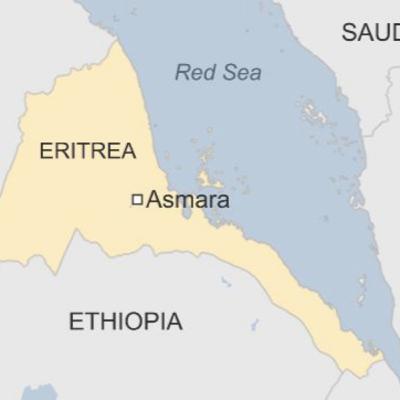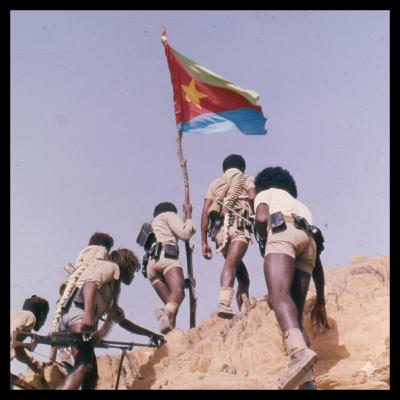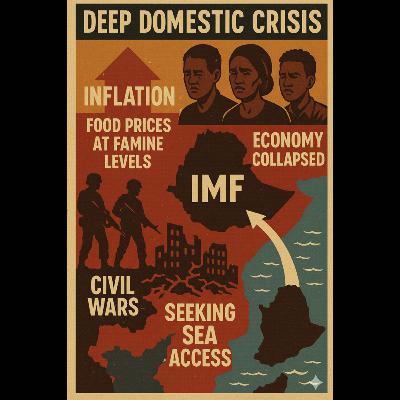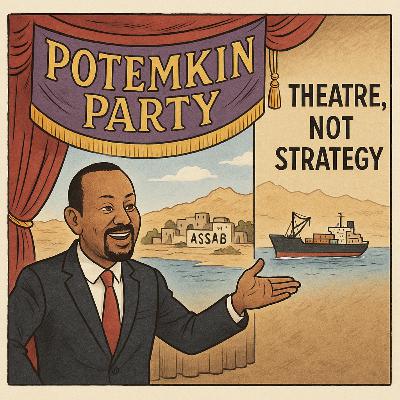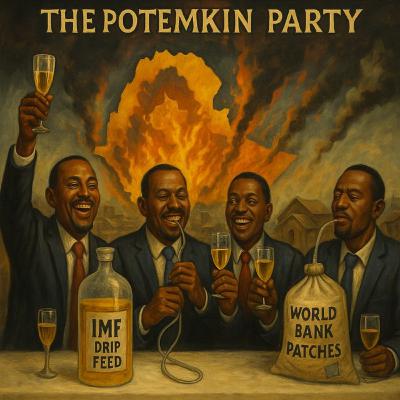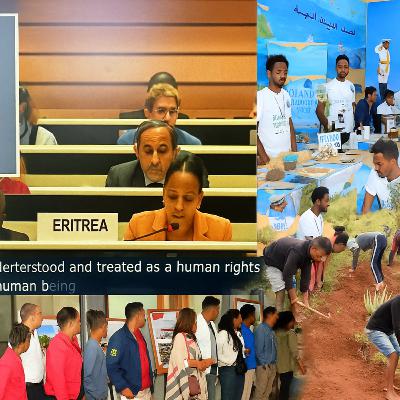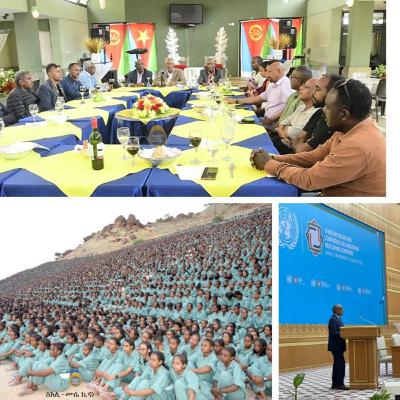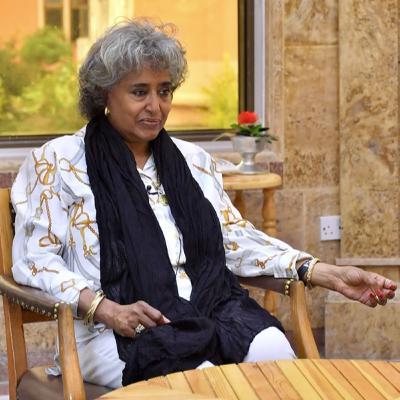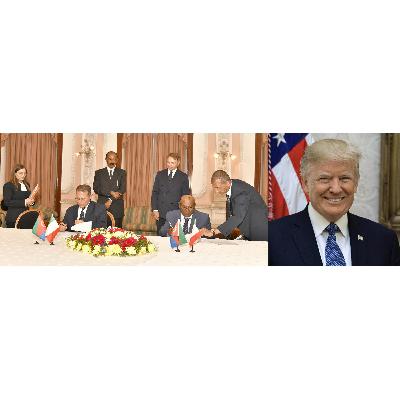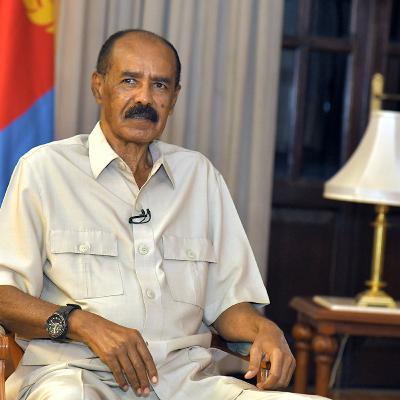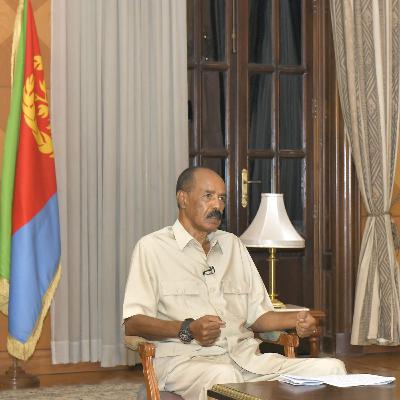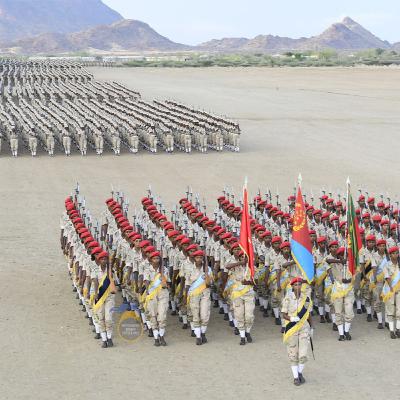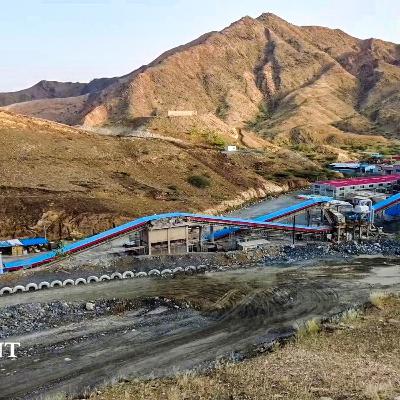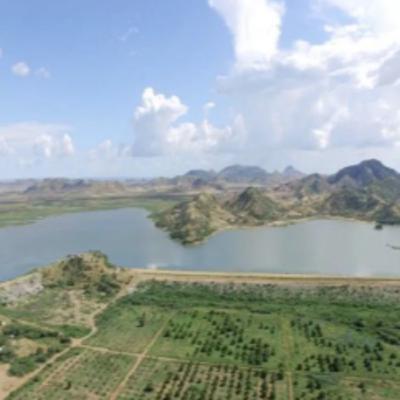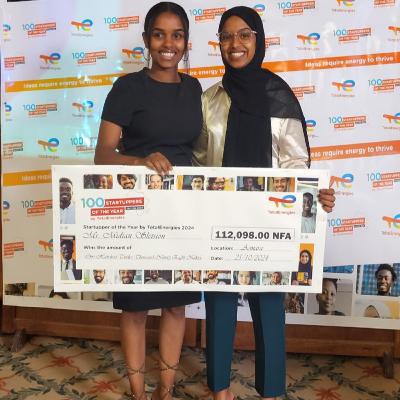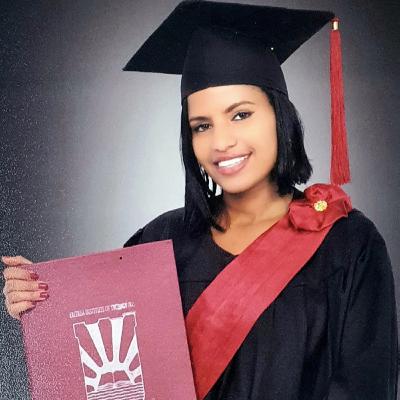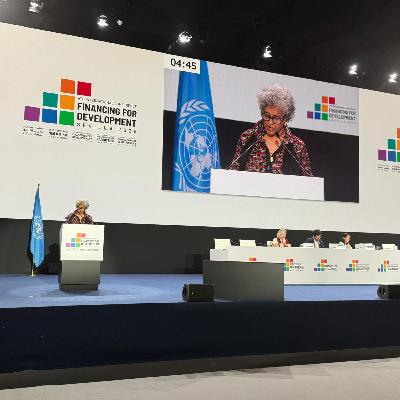Discover The Other Side of Eritrea
The Other Side of Eritrea

The Other Side of Eritrea
Author: Eritrawi
Subscribed: 1Played: 0Subscribe
Share
© Eritrawi
Description
The Other Side of Eritrea is a podcast dedicated to showcasing the rich history, vibrant culture, and inspiring achievements of Eritrea and its global diaspora. We move beyond stereotypes to highlight stories of resilience, innovation, and pride from ancient civilizations and the fight for independence to modern-day successes in art, science, and community leadership. Join us as we explore the beauty, strength, and untold stories of Eritrea that the world needs to hear.
100 Episodes
Reverse
Eritrean delegation's participation at the 80th Session of the United Nations General Assembly, highlighting their diplomatic activities and policy positions. Specifically, the texts document Foreign Minister Osman Saleh's bilateral meetings with numerous foreign officials, including those from the US, EU, Sudan, and Sweden, focusing on security, economic development, and regional stability in the Horn of Africa. Separate statements detail Eritrea’s focus on two key policy areas: gender equality and climate action. Regarding women's rights, an official explained Eritrea's progress in institutionalizing equality, citing increased political participation and reduced maternal mortality. Finally, on climate action, the Foreign Minister articulated Eritrea's ambitious conditional plan for emissions reduction and called for international financial partnership to meet its full target.
We set the record straight on Eritrea’s sovereignty and the myths surrounding Ethiopia’s “loss” of a coastline. Respecting sovereignty is not a courtesy—it’s international law. Eritrea didn’t create an injustice; it corrected one through sacrifice and struggle, reaffirmed by a UN-monitored referendum.So why do some still frame this as an “injustice” or a “problem to fix”? We break down the historical facts, expose the contradictions, and call out the revisionism and bad education fueling this narrative. Sovereignty, annexation, and history are not negotiable points in a think-tank memo—they’re the foundation of international order.Join us as we unpack how nostalgia, imperial fairy tales, and shallow analysis distort reality—and why those distortions can cost lives.
A critique of the Ethiopian government’s rhetoric regarding its demand for sovereign access to the sea, often using the metaphor of being “encapsulated” or a “geographic prisoner.” They argue that this narrative is disingenuous, historically inaccurate, and politically motivated to distract from severe domestic issues like economic crisis and internal conflict. The texts stress that Ethiopia already enjoys robust commercial access to the sea through existing, lawful agreements with its neighbors, particularly Djibouti, and that conflating ownership with access strains regional relations. Ultimately, the sources warn that the rhetoric, which has included veiled threats of force, undermines regional stability and international law, prioritizing nationalist adventurism over necessary cooperation and economic development among Horn of Africa nations.
Ethiopia’s “Potemkin Party” push for sea access is theatre, not strategy. Real growth comes from logistics & treaties, not fantasies of ports. Time for the AU to move meetings, optics, even HQ. Let Addis keep the stage; the AU must keep its soul
Ethiopia's Potemkin Party or PP's expansionist ambitions regarding access to the Red SeaThese claims are a direct threat to Eritrea's sovereignty. Ethiopia's PP rhetoric, are "delusional" and based on historical fallacies, population statistics, and a sense of entitlement rather than international law. Eritrea's independence and borders are firmly established through self-determination and international agreements, making its coastline non-negotiable. The sources highlight the historical context of past conflicts fueled by Ethiopia's pursuit of sea access, emphasizing the devastating human and economic costs, and reject the idea that being landlocked constitutes a "historical injustice" that permits overriding another nation's sovereignty. Ultimately, the texts assert that diplomacy and trade, not coercion or historical myths, are the appropriate means to address logistical challenges, and firmly state that Eritrea's Red Sea access is not for rent or subject to external redefinition.
A multifaceted look at Eritrea, highlighting its commitment to social welfare and human rights, particularly for persons with disabilities, as evidenced by its long-standing efforts and recent ratification of the CRPD. They showcase government initiatives like financial aid for martyrs' families and community-based programs. Furthermore, the sources emphasize Eritrea's rich cultural heritage and national identity, illustrated through festival exhibitions that display ethnic traditions, historical photographs, and art, along with ongoing environmental conservation efforts demonstrating significant community and national participation in greening campaigns and soil protection. Together, these pieces paint a picture of a nation focused on both internal development and the preservation of its unique character.
Eritrea Showcases Commitment to Development, International Cooperation, and National UnityEritrea has reaffirmed its dedication to national development and global engagement through a series of recent highlights that showcase the country’s strategic vision, achievements, and unity.In a statement at the Third UN Conference on Landlocked Developing Countries, Eritrea emphasized its unique role as a transit state with a long Red Sea coastline, advocating for greater solidarity and partnership among developing nations. The country called for collective action to overcome infrastructural and economic challenges, particularly those affecting landlocked states, through investment, cooperation, and fair trade.On the international stage, Eritrea celebrated the achievements of Olympian cyclist Biniam Girmay, whose sporting success has become a source of national pride. His accomplishments reflect Eritrea’s ability to inspire and mobilize its citizens to contribute to the country’s development goals.National service remains a cornerstone of Eritrea’s development strategy, fostering academic growth, vocational skills, and strong national values among its youth. This initiative continues to prepare young Eritreans to participate meaningfully in the country’s economic and social progress.The Eritrean diaspora also plays a vital role, maintaining active engagement and supporting national programs. Their contributions underscore a shared commitment to unity, resilience, and the long-term vision for a peaceful and prosperous Eritrea.Eritrea’s ongoing efforts highlight the nation’s determination to strengthen both its internal capacity and its international partnerships, ensuring progress that benefits all citizens.
Ambassador Sophia Tesfamariam dismantles with facts Ambassador Dina Mufti's article "Transcending the Ethio-Eritrean Conundrum," arguing that it misrepresents history and undermines Eritrea's sovereignty under the guise of regional integration. The author, Ambassador Sophia Tesfamariam, challenges Mufti's historical revisionism regarding Eritrea's independence and the 1998-2000 Eritrea-Ethiopia war, emphasizing Ethiopia's defiance of the Eritrea-Ethiopia Boundary Commission (EEBC) ruling. The text asserts that true regional peace requires honesty, justice, and adherence to international law, including the inviolability of borders, rather than Eritrea's capitulation to Ethiopian hegemonic ambitions. Ultimately, it portrays Eritrea's stance as principled and rooted in sovereignty, countering narratives of intransigence.
Analyzing the significant diplomatic developments concerning Eritrea, primarily focusing on its strengthening bilateral ties with Italy. A high-level Italian delegation visited Eritrea to sign a comprehensive plan of action, aiming to enhance cooperation in various sectors like energy, infrastructure, agriculture, and maritime security. This agreement signals a new phase of collaboration and potential investments, with both nations planning a future business forum. Additionally, the text reveals a message from former U.S. President Donald Trump to Eritrean President Isaias Afwerki, expressing a desire to re-establish a respectful and productive relationship between the U.S. and Eritrea, emphasizing peace and prosperity in the Horn of Africa.
This episode dives into an interview with President Isaias Afwerki of Eritrea, outlines the nation's comprehensive vision for national development and diplomatic strategy. President Afwerki details ambitious plans focusing on economic growth through agricultural expansion, including cotton and sugarcane cultivation, and the harnessing of marine resources. Furthermore, the discussion highlights critical initiatives in infrastructure development, specifically in water storage through dam construction, energy production via regional mini-grids, housing and urban planning, and improving transportation networks. Beyond domestic priorities, the interview addresses Eritrea's foreign policy, emphasizing constructive engagement in regional and international affairs, and the crucial role of strategic communication in shaping the nation's narrative amidst a landscape of disinformation.
Today we're looking at a comprehensive overview of recent developments in Eritrea, highlighting the nation's focus on agricultural progress through initiatives like the vegetable seed documentation workshop and the inauguration of the Dirfo Dam to improve water access. They also emphasize educational advancements, demonstrated by the graduation of health professionals from Orotta College and seminars for the diaspora promoting national awareness and consular services. Furthermore, the texts underscore Eritrea's diplomatic engagement with the presentation of Ambassador Alem Tsehaye's credentials to Sri Lanka and the vibrant Eritrean community festivals abroad that foster unity and national identity. These collective efforts paint a picture of a country actively working to strengthen its infrastructure, human capital, and international relations.
This episode analyses the interview of President Isaias Afwerki, offers a comprehensive outlook on Africa's path toward self-reliance and regional integration. President Afwerki emphasizes that Africa, despite its vast natural resources, remains underdeveloped due to external interference and debilitating dependency on aid. He advocates for internal transformation, industrialization, and the development of indigenous knowledge systems to overcome this hindered state. The interview also touches upon Eritrea's foreign policy, particularly its efforts to normalize relations with the United States and address regional instability in the Horn of Africa, largely attributed to external manipulation and internal divisions. Finally, President Afwerki stresses the crucial need for regional cooperation and the establishment of robust, sovereign institutions as essential for achieving lasting peace and development across the continent.
This episode discusses the the nterview with President Isaias Afwerki on July 19, 2025.President Afwerki focuses on Global Affairs." In this interview, President Afwerki discusses the historical trajectory of global affairs, particularly focusing on the transition from a bipolar Cold War order to a unipolar system, and its consequences for nations like Eritrea. He argues that the unipolar order, led by the US and its allies, has been based on flawed assumptions and has led to instability and exploitation, as exemplified by the conflict in Ukraine. The President concludes by asserting that the unipolar system is unraveling, paving the way for a new, but currently undefined, global order, emphasizing the need for marginalized nations to actively participate in shaping a more just and inclusive future.
This episode describes the Sawa graduation ceremony in Eritrea, a significant event marking the completion of secondary education and military training for young Eritreans. Sawa is presented as a "melting pot" fostering national unity among the nine ethnic groups, with the program integrating academic studies, military instruction, and cultural education. The ceremony itself featured a military parade rich in symbolism and diverse artistic performances showcasing Eritrea's cultural heritage. Speeches from President Isaias Afwerki and Colonel Debesay Ghide highlighted the program's goals of academic achievement, national development, and holistic personal growth, emphasizing the comprehensive year-long curriculum and the increasing participation of girls. Ultimately, Sawa is depicted as a transformative experience preparing youth for future success and national service.From Shabait by Mussie Efriem
This episode examines Eritrea's unique approach to national development, specifically addressing the common misconception of the "resource curse." It argues that Eritrea treats natural resources as only one component within a broader, holistic development strategy that prioritizes human capital, infrastructure, and agriculture. The source emphasizes Eritrea's cautious management of its mineral wealth, aiming for sustainability and public ownership, and highlights its "zero tolerance" policy on corruption. Ultimately, the text suggests that Eritrea's measured progress in health and education, along with its stability and low corruption rates, differentiate it from other resource-rich nations.From Shabait by Bana Negusse
This episode dives into Nahla Valji's article, Five lessons from Eritrea’s self-reliance in an era of global aid cuts.Eritrea's Self-Reliance: A Development Model for a Changing World Nahla Valji, UN Resident and Humanitarian Coordinator in Eritrea, discusses Eritrea's approach to self-reliance in an era of global aid reductions. It highlights how Eritrea has prioritized its own national development agenda, rather than solely relying on external assistance, and offers five key lessons from its model. These lessons include setting national priorities for aid, strengthening domestic resources, investing in human capital, fostering collective effort within communities, and building long-term resilience. The article suggests that while Eritrea's model has complexities, it offers valuable insights for other nations facing similar financial constraints and shifting global aid landscapes.
This episode dives into tghe Statements from Eritrea's Minister of Information and Ambassador Sofia Tesfamariam, who collectively argue against the United Nations Human Rights Council's (UNHRC) targeting of Eritrea. Both contend that the UNHRC's mandate concerning Eritrea is politically motivated, rather than based on objective human rights concerns. They suggest that Western states exert undue influence, using human rights mechanisms as tools for foreign policy and to penalize Eritrea's independent development path. The authors assert that this politicization undermines the UNHRC's credibility and impartiality, fostering a system where sovereign nations face selective punishment while others are shielded. Ultimately, the texts call for comprehensive reform of the UNHRC to ensure equitable treatment and genuine multilateralism for all member states, particularly those from the Global South.
The episode highlights two young Eritrean female chemical engineers, Khamail Alhassen Mohammed and Midian Seletsion Mogos, who won the "Power' Up" category in Total Energies' Start Upper of the Year Challenge. Their award-winning project focuses on producing eco-friendly and affordable biocharcoal briquettes from Prosopis juliflora, an invasive tree in Eritrea, addressing both environmental concerns and the need for sustainable energy. The engineers share their educational backgrounds, experiences in the competition, and their broader vision for using chemical engineering to solve societal problems. They also offer encouragement to other young women to challenge stereotypes and pursue their potential in STEM fields, emphasizing the support available to them. Finally, they express gratitude for their educational opportunities and support systems, hinting at future innovative solutions.
This episode profiles Ruth Yohannes, an Eritrean civil engineer who exemplifies the nation's career-driven women contributing to development. It highlights her educational journey through the Eritrean system, including her transition from teaching mathematics and physics to her current role as a supervisor at Segen Construction Company. The piece emphasizes her belief in women's ability to multitask, balancing her engineering career with her passion as a makeup and nail artist. Furthermore, it discusses her involvement with a club of career-driven women that mentors young females, underscoring the importance of psychological preparedness and the opportunities provided by free education in Eritrea.Source Shabait by Sabrina Solomon
This episode dives into the statement from Eritrea's representative, Ambassador Sophia Tesfamariam, delivered at the Fourth International Conference on Financing for Development in Seville, Spain, on July 2, 2025. This statement outlines Eritrea's perspective on global development challenges and solutions. It emphasizes the existential imperative of development for Least Developed Countries (LDCs), highlighting issues such as structural inequalities, limited productive capacity, technological barriers, and the detrimental impact of unilateral coercive measures. The statement advocates for a reconfigured global financial and economic system based on equity and sustainability, while also reiterating Eritrea's commitment to self-reliance, national ownership, and improved international tax cooperation.


